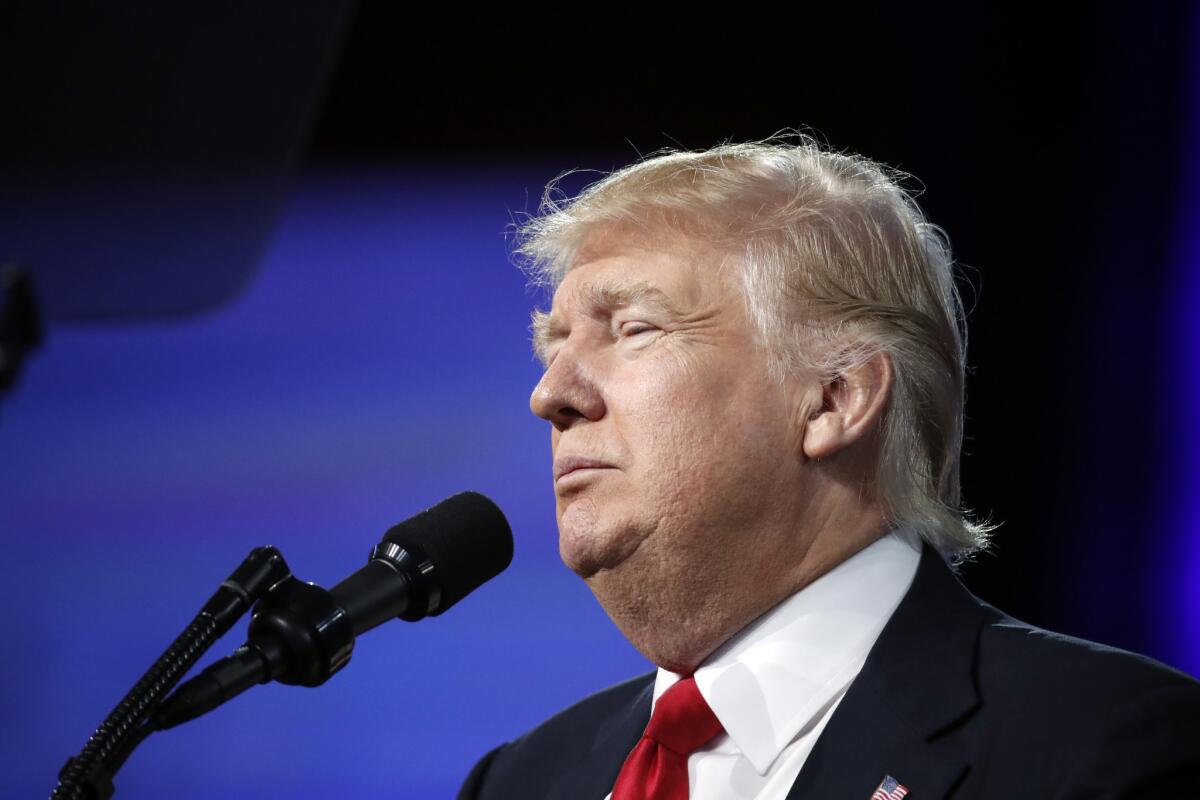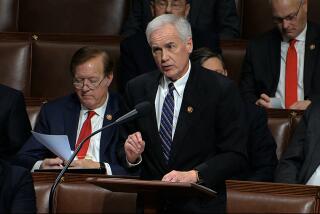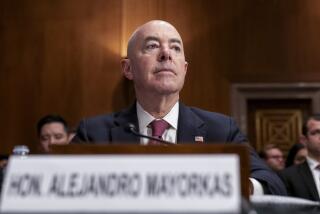Editorial: Trump was rightly impeached. Now the Senate must do its job and convict

- Share via
In voting Wednesday to impeach President Trump — for a second time — the House responded in the only responsible way it could to Trump’s outrageous encouragement of the domestic terrorists who invaded the Capitol last week.
Ideally, the Senate would reconvene on an emergency basis and try and convict Trump before he makes the exit from the White House next week — an exit that he tried to forestall by lying to his followers about a rigged election. But if Senate Majority Leader Mitch McConnell (R-Ky.) continues to keep the Senate in recess until Jan. 19, as McConnell has regrettably said he will, the trial must proceed after Trump’s term ends and Joe Biden becomes president.
Legal scholars can debate whether the Constitution allows an impeachment trial after a president leaves office. But allowing the calendar to save Trump from accountability would send the message that presidents are free to engage in gross misconduct so long as they do it late in their term.
Trump committed an impeachable act when he exhorted loyalists on their way to the Capitol to “fight like hell” and “stop the steal,” which was part of a larger effort to thwart democracy that also included his attempts to pressure election officials, state legislators, Congress and his own vice president to overturn the results of November’s election. The weeks of Trump’s incessant, hyperbolic and baseless attacks on the integrity of the vote culminated in a violent attack on Congress as it moved to certify Biden’s victory, leading to five deaths, multiple injuries and the desecration of the Capitol.
The president’s video Wednesday calling for his supporters to calm down was welcome, but it only emphasized how reprehensible his remarks were up to and in the immediate aftermath of the Capitol riot.
Wednesday’s vote to impeach Trump for “incitement of insurrection” was an indispensable rebuke to a president who has disgraced his office in his desperate efforts to cling to it. The message would have been even more powerful if more Republicans had joined 10 members of their party — including Rep. Liz Cheney of Wyoming, the third-ranking Republican in the House — and all 222 Democrats in recognizing the reality that Trump committed high crimes and misdemeanors.
Convicting Trump will require a two-thirds vote in the soon-to-be Democratic-controlled Senate, which translates to at least 17 Republican votes on top of all 48 Democrats and two independents. Given how great the president’s transgression was, it should be an easy call. There is no reasonable way to defend how Trump undermined the public’s faith in elections for his own gain, or how he recklessly stoked the passions of his followers in the hope of intimidating Congress into voiding Biden’s win.
Certainly, House Republicans offered no such defense in their futile effort to stop impeachment. Instead, they offered a grab bag of unpersuasive arguments that ranged from hollow pleas for national healing to what-aboutism to the airing of familiar grievances about “the left,” “cancel culture,” Black Lives Matter, last year’s violence in some cities, Big Tech and the Russia investigation.
House Minority Leader Kevin McCarthy of Bakersfield, who has shamefully abetted Trump’s denial of reality and who supported a preposterous lawsuit seeking to overturn election results, said that Trump “bears responsibility” for the siege of the Capitol. Then he voted to spare Trump from real accountability by voting against impeachment, after floating the weak alternatives of a fact-finding commission and a resolution to censure Trump.
To rebut the claim that Trump incited insurrection, Rep. Tom McClintock of Elk Grove noted that in Trump’s Jan. 6 speech the president talked about protesters “marching over to the Capitol building to peacefully and patriotically make your voices heard.” But that passing reference to peaceful protest was utterly overwhelmed by the fiery language of the rest of Trump’s speech in which, as Cheney rightly said, he “lit the flame of this attack.”
The sole California Republican to support impeachment was David Valadao of Hanford, who regained his seat in Congress in November after having been ousted in the 2018. Valadao rightly put the focus on Trump’s actions, not the hasty impeachment process. “His inciting rhetoric was un-American, abhorrent, and absolutely an impeachable offense,” Valadao tweeted. “It’s time to put country over politics.”
Other Republicans got lost in the legalistic weeds. Rep. Gregory W. Steube of Florida argued that Trump couldn’t be impeached because his speech didn’t satisfy a test for criminal incitement established in a Supreme Court decision. But impeachment isn’t a criminal process. Rep. Lee Zeldin of New York fallaciously suggested that because some terrorists may have taken actions before or during Trump’s speech, that somehow absolved the president of inciting others to storm the Capitol.
It was revealing that the Republican who led the opposition to impeachment was Rep. Jim Jordan of Ohio, a shrill Trump apologist who was the undeserving recipient of a presidential Medal of Freedom, saluting his leadership in “the effort to confront the impeachment witch hunt” — a reference to Trump’s first impeachment. (Jordan took time out from his latest defense of Trump to suggest that Cheney should be removed as chair of the House Republican Conference.)
McConnell said Wednesday that he hasn’t decided how he would vote at an impeachment trial, following a New York Times report that he was pleased that the House was moving toward impeachment. There’s no task more pressing for the Senate at the moment than to hold Trump accountable for the damage inflicted last week, and McConnell should do his part to ensure that the trial begins as soon as possible. But if that reckoning must wait until after Trump leaves office, so be it.
More to Read
A cure for the common opinion
Get thought-provoking perspectives with our weekly newsletter.
You may occasionally receive promotional content from the Los Angeles Times.










